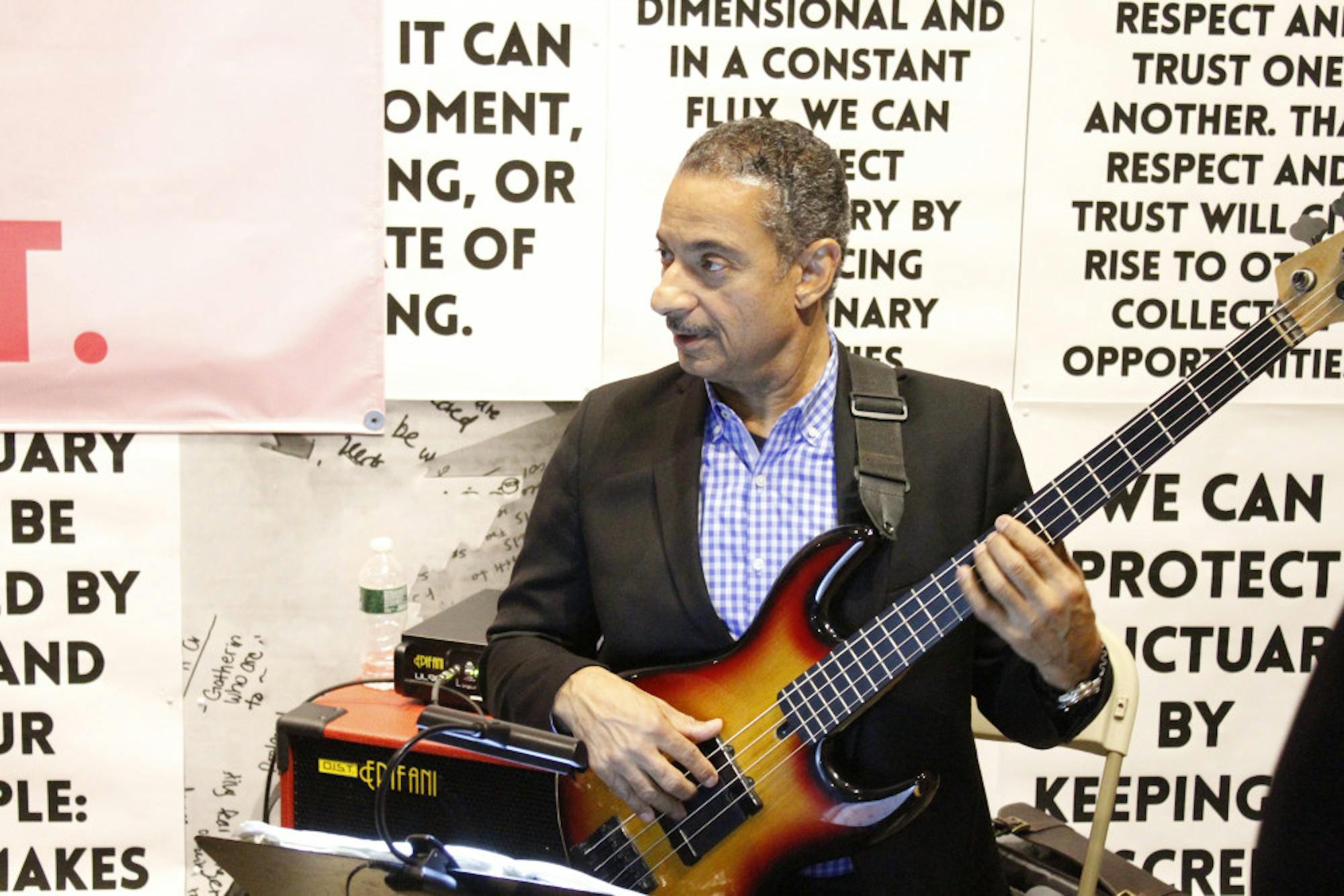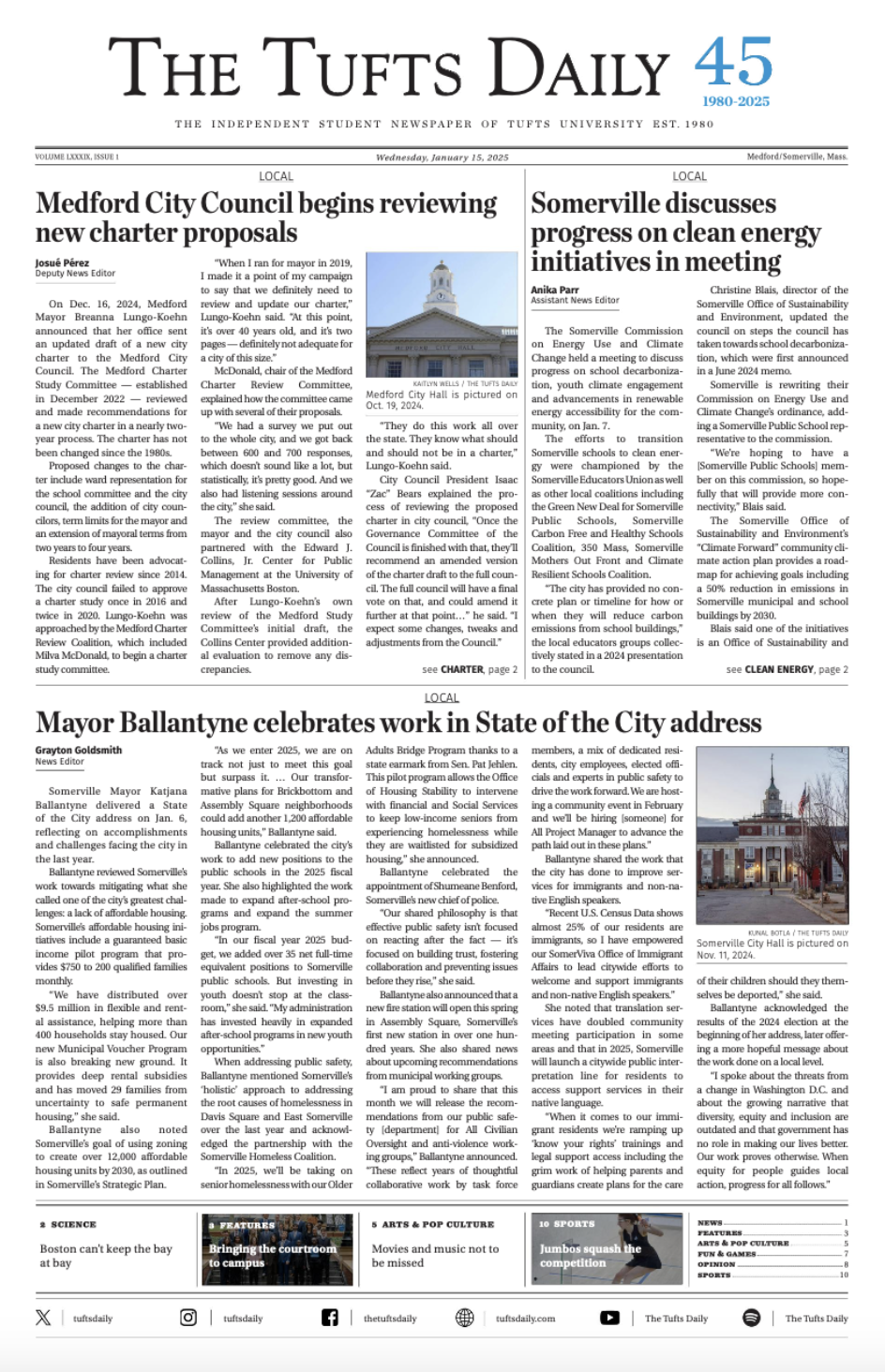In celebration of its 50th anniversary, the Africana Center held a series of events for alumni and students during Homecoming weekend. The celebration included receptions, networking and tours around campus.
The celebration kicked off at the Tufts University Art Galleries in Aidekman Arts Center with an opening reception where alumni checked in and listened to opening remarks by the Director of the Africana Center Katrina Moore, University President Anthony Monaco and two alumni.
In her opening statement, Moore said the event was intended to celebrate the “existence and accomplishments” of the Africana Center over the course of 50 years, focusing on celebrating black excellence at Tufts. Part of the 50th anniversary celebration includes an exhibit celebrating black students on Tufts’ campus from the early 1900s.
“[The exhibit] was our first order of business to raise awareness of the presence of black students on campus in the early 1900s, as well as to highlight the many accomplishments of our students, which resulted in the establishment of the Africana Center in 1969,” Moore said.
Moore stressed that the exhibit also aimed to continue building such black presence on campus.
“The exhibit also highlights the need for us to remain focused on our recruitment efforts to increase the number of black students into our ranks,” she said. “I hope that you will take the time to look at that graph and absorb the progress, or lack thereof, that we have made over the last 50 years as far as the number of black students [at Tufts].”
Moore then welcomed Monaco to the podium for his remarks. Monaco started by placing the establishment of the Africana Center in the context of the Supreme Court’s 1954 decision in Brown v. Board of Education of Topeka, which ended state laws forcing race-based segregation of public schools.
“Tufts, like many schools in New England, was pushed to provide safe spaces and support around identities in the form of cultural and identity-based centers,” Monaco said.
Monaco praised the Center’s role on campus, saying that it has led to dramatic change.
“The establishment of the Center was a catalyst for even more progressive change on campus to amplify the voices of student activists who call for university-wide support both for themselves and for their peers,” he said.
Monaco said that student activism on campus has led to the hiring of more faculty and staff of color, although he acknowledged that hiring and retaining faculty and staff of color continues to be an issue for the university.
In his talk, Monaco also highlighted the recent establishment of the Africana Studies program, the Students’ Quest for Unity in the African Diaspora pre-orientation program and the FIRST Resource Center.
David Carl (LA'96), president of the Tufts Black Alumni Association, then took the stage to encourage contributions to the Africana Center and credited alumni with the center's continued ability to function.
Doug Harris (LA’81), who co-sponsored the welcome reception and directs the Kaleidoscope Group, a diversity consulting company, encouraged attendees to meet new people at the event.
Moore also mentioned that the welcome reception occurred around an exhibit by Sanford Biggers, which highlights police gun violence and, according to Moore, reimagines the Africana Center as Wakanda from the movie "Black Panther" (2018). Moore said that such a reimagining shows how the Africana Center functions as a support for people of color who face daily violence.
The event ended with a performance by Joel Larue Smith's Tufts Jazz Quartet.
The rest of the weekend featured events such as the Tuftonian Wakanda Gala on Saturday night, the fifth annual Tufts Black Homecoming Tailgate Affair and other receptions and brunches.
In addition to the events for alumni, the weekend featured significant fundraising, including “50 for 50th,” which strove to get 50 donors to give $1,000 or more to support the Africana Center.
Phil Stanley (LA’85), an alumnus who attended the tailgate affair, reflected on the importance of the Africana Center during his time at Tufts.
“[The Center] was a place to get grounded, to get acclimated … it was kind of a substitute for being at home,” Stanley said. He added that the Africana Center served him well as a place to deal with the academic challenges that he faced at Tufts.
Casey Carpenter (J’80), another alumna who attended the event, said she lived in Capen House and held a work-study job where she edited a newsletter sent out to students of color.
Carpenter commented particularly on the impact that the Africana Center and Tufts had on her work and social balance.
“I managed to go to parties and to graduate magna cum laude, so I figured out how to have fun … it really taught me how to socialize with my peers,” she said. “I learned responsibility working here, and it did a lot for me personally and I think we all grew because we all lifted each other.”
She added that she was surprised to see so many alumni of color on campus.
“It’s incredible because when I was here, there were very few students of African, Caribbean descent … so it’s incredible to come back and see all these people,” she said.
Africana Center celebrates 50 years with Homecoming events

Joel LaRue Smith's jazz quartet performs in the Tufts Art Gallery at the welcome reception on Oct. 18 to kick off the 50th anniversary celebration of the Africana Center.





